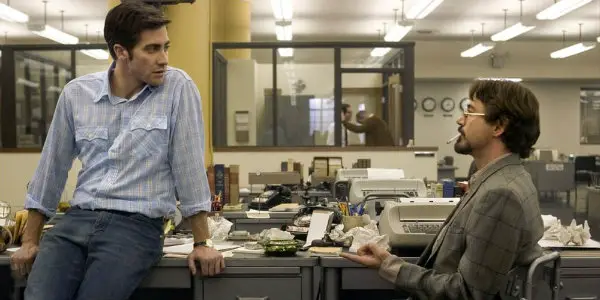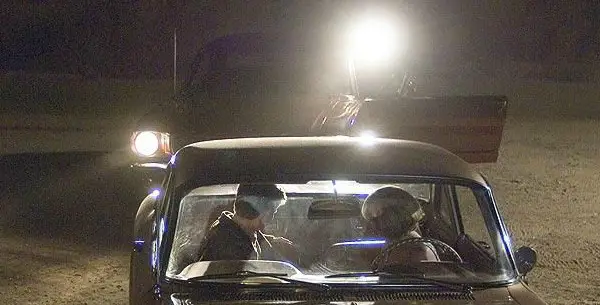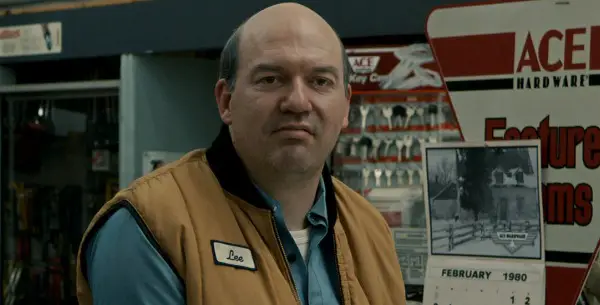Career Cancer Or Master-Pisces? ZODIAC Gets The Take Two Treatment

'Books, records, films – these things matter. Call me shallow…
Welcome to the first edition of Take Two, the series that is mature enough to hold up its hands and say “maybe I was wrong.”
From your first watch to your second, has a movie gone from marvellous to meh? Has an initial viewing ever left you cold, only to later warm the c*ckles of your heart? Have you ever been so stubborn, anti-mainstream and cantankerous that you’ve point-blank refused to admit that a certain film has any merit at all whilst everyone else claims it’s the cinematic second-coming? Apologies. This is supposed to be therapeutic, not therapy.
The question of which film to cover first was obvious, as if it was written in the stars: Zodiac.
Zodiac In One Take
The year was 2007. David Fincher’s last picture was Panic Room (2002) which was largely considered a minor misstep after a string of successes. However, the home invasion thriller still boasted Fincher’s brooding timbre, an intriguing premise and a quality cast. Previously, Fight Club gathered all of the pre-millennium tension that was omnipresent in 1999 and channelled it into idealistic, quotable rhetoric and anti-capitalist anarchism. It felt like Fincher’s manifesto.
Preceding that, and a more subdued affair after the runaway success of Se7en, The Game (1997) is a master class in misdirection which cemented the director’s ability to keep an audience guessing until the final frame. It was fair to say I was a Fincher fan boy. Hell, I even used to try and argue that Alien 3 was the finest of the sci-fi franchise.

I had high expectations of Zodiac. Conspicuous by its absence from the above is Se7en because for this, then twenty-something, the ground-breaking crime drama set the guidelines for what Zodiac should and could be. I wouldn’t blame you for shouting at the screen at this point. The Zodiac killer seemed akin to Se7en’s John Doe: an ultra-intelligent, press-goading, driven serial killer with an agenda. Those hot on his heels seemed doomed to fail until the final hurdle, when the killer would receive his comeuppance, even if it also unfortunately meant the completion of his master plan. Why wouldn’t Zodiac follow the same formula? Surely journalists catching a killer would be as enthralling as cops catching a killer. Right?
It all added up to something great. The cast was stellar: the renaissance of Robert Downey Jr was in its infancy as he played third wheel to leading man Jake Gyllenhaal and on-the-up supporting actor Mark Ruffalo, whilst the supporting cast boasted everyone from Indie darling Chloë Sevigny, former Hannibal Lecter Brian Cox and Mother Goose, Anthony Edwards. Furthermore, being based on a true story promised to give Zodiac an undoubted air of authenticity that was too close for comfort whilst the trailer threatened all of Fincher’s signature flair.
“Bloody hell! Where’s my dinner? I could’ve watched Zodiac by now!”
What transpired in the cinema though, was as history remembers it, a three hour, bloated and frankly boring film where the only thing killed was the feeling in my behind which suffered the indignity of having to sit through it. On a similar theme, it also became the butt of many a joke: “Bloody hell! Where’s my dinner? I could’ve watched Zodiac by now!” “Coldplay? Nah, they’re the musical equivalent of Zodiac!” Etc, etc.
The lack of a satisfying ending was frustrating and an insult to anyone who had invested so heavily, even when armed with the knowledge that the killer was never caught. The performances were subdued and unmemorable whilst the focus was placed firmly on the newsroom rather than at the scene. In fact, it’s quite difficult to surmise; there was nothing that stood out in terms of soundtrack or shots, dialogue or direction.
The most coherent comparison on offer is that it was reminiscent of the difference between The Wire Season 1 and Season 5. Expectations pointed to Zodiac resembling Season 1: gritty, at the scene of the crime, with compelling characters blurring the lines of right and wrong to catch their man. As memory serves, what Zodiac turned out to be resembled Season 5 of The Wire: removed from the reality of the crimes, unfurling in the headlines rather than at the scene, and with characters who are shadows of their former selves (the comparisons between The Wire’s McNulty and Robert Downey Jr could go much further). Most of all, yes, there was disappointment that Zodiac wasn’t Se7en 2. (4ourteen? No? Ok.)
So, spurred on by contrasting opinions of colleagues and co-workers, and ten years older and supposedly wiser, a second screening of Zodiac was scheduled. If nothing else, it would allow for a nice long nap. See, it’s the gift that keeps on giving.
Zodiac opens with an impressive lingering tracking shot of a suburban street, showing house after house of average Joes. Filmed from the perspective of the driver, the viewer is immersed in the narrative immediately and the suburban setting conjures all those connotations of safety and security which we know we’re about to say goodbye to. First scene in and I’m sold. This could be awkward.
Take Two
That the driver is the first person murdered by the Zodiac killer amplifies the feeling of immersion. Here, a long and lingering scene where the Zodiac is (in typical Fincher fashion) always in the shadows, surveys the scene and leaves, lulling the viewer into a false sense of security before he returns shortly after to finally commit the crime. The graphic assassination of the driver and her lover is not a clean, quick bullet to the head, but a flustered and frantic affair, where bullets graze the skin and splinter the bone.
The juxtaposition of this harrowing scene alongside the soundtrack of Donovan’s “Hurdy Gurdy Man” creates that jarring effect, where you find yourself getting your 70’s groove on when you should be recoiling in horror. It’s only early doors and already the film is creating memorable moments; what was I doing in the cinema all those years ago to not remember any redeeming features? That’s probably best left unanswered.

Ashamedly, criticism of the film’s 157 minute runtime was difficult to maintain as Fincher wastes little time in exploring the case, highlighting the most pertinent points then moving on, frequently jumping a week, a month, a year ahead. The pieces of the case come together quickly, flitting from the police investigation to the journalist’s research, making the audience active investigators themselves. That this is Fincher’s first feature whose credit sequence accompanies the action rather than being standalone (or missing altogether) speaks volumes of how much there is to tell and how little time there is to tell it.
However, the performances were as remembered. Mark Ruffalo was solid but not spectacular as Inspector David Toschi who keeps getting pulled back into the case. Jake Gyllenhaal was engaging and believable as Robert Graysmith, the Newspaper cartoonist on the fringes of the case, whose obsession to catch the killer overtakes and outlasts the police and the press. Robert Downey Jr was, well, Robert Downey Jr. Supporting characters such as Sevigny, Edwards and Cox are exactly that; underwritten and underused but no doubt just happy to be invited.
Happily though, there were even enough similarities with Se7en to stop me whinging. It’s such a shame that libraries are closing down when library cards can be so instrumental in helping to catch the more literate criminal. A coffee shop meeting between Graysmith and Toschi mirrors that held by Mills and Somerset, and a stairway conversation harks back to Se7en’s John Doe hiding in plain sight as a press officer. It’s the contrasts with Se7en that make comparison between the two seem unfair; here, the audience are witnesses to the murders whilst Se7en only allows us to see the aftermath. I’m not suggesting that Zodiac is a better film, but it was certainly more actively involves the viewer.

Finally, the lack of a satisfying ending was a notable part of the frustration with the film but, of course, it echoes the frustration of the characters and those actually involved. The viewer’s need for closure is as close to being sated as possible in the across-the-aisle stare between Gyllenhaal’s Graysmith and the previously accused, Arthur Leigh Allen (a splendid John Carroll Lynch). In this moment, the subtle slips of Allen’s poker face are as incriminating as any of the Zodiac’s confessional letters and Graysmith’s suspicions are as good as confirmed, although not actionable.
Final Cut
As a self-proclaimed Fincher aficionado then, have I been unduly harsh on Zodiac for all these years? Are all the elements there that made me fall in love in the first place? Fincher’s directorial flair: Check. Standout soundtrack: Check. Captivating content, a sombre yet rich palette, a downbeat denouement: Check, check, check. Does it invite repeated viewings: Err…not so much. But it certainly deserves a second chance.
So was my initial disdain down to the fact that the film is more suited to viewing on the flat screen rather than the big screen? Was it the rise of detailed and deliberate crime dramas that pick apart a case over the course of the season, à la The Killing and, yes, The Wire? Perhaps the ten years since release have made me a more considered individual and less dependent on cheap thrills and quick fixes (It hasn’t!) that Zodiac doesn’t deliver.
With all that in mind I don’t think I was wrong…at the time. I might have to retire the Zodiac jokes once and for all though. Just don’t get me started on The Curious Case of Benjamin Button.
Which films do you think deserve a Take Two? Let us know which and why in the comments and see if you can change our mind.
Does content like this matter to you?
Become a Member and support film journalism. Unlock access to all of Film Inquiry`s great articles. Join a community of like-minded readers who are passionate about cinema - get access to our private members Network, give back to independent filmmakers, and more.
'Books, records, films – these things matter. Call me shallow but it’s the f*****n’ truth.' Freelance writer, amateur musician, professional misanthrope. https://redbezzlebrand.wordpress.com/













